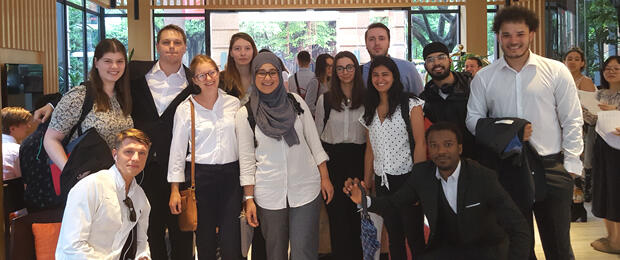You are here
Home ›Effective methods in preparing students for international experiences
by Fraser Deas
21/07/2021
Higher Education Institutions

Most of us working in the mobility sector are motivated by the transformational experience that international mobility offers students - the exciting new awareness of different cultures and norms, the development of employability and life skills and the often extraordinary personal growth gained. However, these powerful experiences are often considered ‘out-of-reach’ by exactly those students who would benefit most from them: students from widening participation backgrounds and with limited financial means. In 2017, the University of Bristol decided to address this disconnect by creating a new programme called Bristol Interns in China or ‘BIC’, supported by Access and Participation Plan funding.
BIC was an innovative year-long programme that brought together 10-12 widening participation undergraduate students, most of whom had no previous international experience, and prepared them, through a variety of Mandarin classes and culture and careers workshops over the course of a year, to embark on a fully-funded eight-week summer internship. We selected Southern China as the location as we wanted students to be immersed in a country vastly contrasting in culture, climate and homogeneity from the UK. A deciding factor in launching this new scheme was our partnership with the British Council’s Generation UK programme. We felt that this collaboration would give our new scheme valued legitimacy as well as the required programme and China expertise.
Having now worked with three cohorts of Bristol Intern in China students, across two in-person and one virtual programme, we can say with confidence that BIC has indeed been a truly transformational experience for the 32 participating Bristol students.
Over the course of the BIC programme, we also learned about what helps students to thrive on placements in countries like China. We learned that it made a real difference to acquire some basic Mandarin as students who did were much better equipped to navigate challenges. Our on campus pre-departure programme saw students undertake 20 hours of Mandarin lessons, teambuilding activities, and sessions on Chinese culture and business etiquette throughout the academic year leading up to their placement. Getting students to build relationships with their Bristol cohort and our staff coordinator in advance of their mobility helped students feel supported upon arrival in China and during the common wobbles experienced in the first few weeks. We also learned from our first cohort that it was better to tell students that they would experience feeling overwhelmed at some point while overseas, but that this feeling would dissipate with time. Lastly, we learned that high-quality, on-the-ground pastoral support from the internship delivery partner was key, as well as close communication with our Coordinator.
Some might ask, why send students with limited travel experience all the way to China? Outside of the obvious answers about China now being the second biggest economy in the world and a country of strategic importance for the UK, our answer would be that China offers students immense opportunities to step far out of their comfort zones. By removing many of the familiar elements of the western world, China requires students to develop a new skill set to navigate daily life there. To successfully engage with China, students must learn to be curious, to persevere through ambiguity, to problem-solve obstacles and to adopt a new lens by which they begin to understand a such a different and unique culture.
Our experience has been that students have gained hugely from our Bristol Interns in China programme. When surveyed afterwards, all participants said that they would repeat the experience again and a majority of our students said that they hoped to return to China later for work or travel. “The programme was an adventure of a life-time, I would do it all again if I could. The skills that I have gained from the programme have been invaluable” said one student. Very few had anticipated how dynamic, advanced, and complex China is as a country, and how the two months living there would also shift their own worldviews.
Importantly, participants also believed the programme helped to clarify their career ambitions. One student stated “this programme has been such an unforgettable experience and has helped me gain the confidence to do more things outside of my comfort zone. I now have a better understanding of what I want from my future career and have learnt so much more about working internationally.”
As a mobility team, it’s been a learning curve to send students to China, but the Generation UK BIC scheme has also been one of our most rewarding programmes across both our study abroad and summer programmes. While the BIC programme in its current guise has ended, we most certainly intend to continue to send future generations of Bristol students on mobility programmes to China.
Key takeaways from the Bristol Interns in China Programme:
- Compared to study abroad destinations in Europe, China offers students a unique opportunity to step outside of their comfort zone and experience a very different culture.
- Preparing students before departure through language classes, cross-cultural workshops and discussions around the challenges that they will face are key for a successful programme and positive experience.
- Short-term programmes (8-week internships) provide students with enough time to engage with Chinese culture, navigate a new daily routine and develop important skills such as perseverance and problem-solving.
- Working with the British Council though the Generation UK campaign gave BIC legitimacy and provided valuable China insight and expertise.
Author:
Edith Li Ross, Deputy Head of Global Opportunities, University of Bristol
Theme:
Latest Blog Posts
04/03/2024




Add new comment
Please note that comments by non-members are moderated. They do not appear on the site until they have been approved. Comments by registered members appear here immediately. Your email address will not be published. All fields are required.